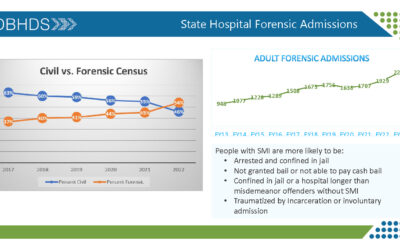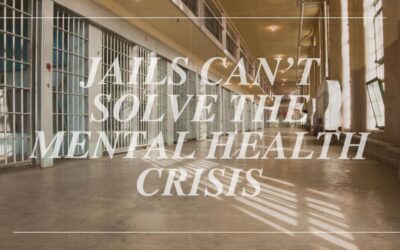March 14, 2024
Amend the Assault on a Protected Person Statute: Sign HB267/SB357
We urge Governor Youngkin to sign HB267 and SB357 to Amend the Assault on a Protected Person Statute. The bills will improve public safety by removing vulnerable people from our criminal justice system who do not belong there.
The General Assembly has approved bills to help fix one of the broken ways we respond to someone who needs help. Currently, someone with a serious mental illness or intellectual/developmental disability faces felony charges if their behavior, in the midst of a mental health crisis, gets them arrested for assault against an officer. They are taken to jail and upon conviction receive a mandatory minimum 6-month jail sentence, and could get up to 5 years in prison. Virginia State Police report that in 2022 there were 200 arrests under this statute when an officer was called to assist someone with a mental illness.
Most of the “assault” behavior charged under the current statute does not result in bodily injury. It can be throwing water at an officer or official or resisting being handcuffed. 90% of these arrests are without injury to the officer or very minor injury. However, if there is any assault against the officer, no matter how minor, the person is charged with this felony assault. A family member who calls police for help ends up regretting that call for the rest of their life.
The damage to someone with a serious mental illness from spending months in jail can be devastating. Isolated from family support, without previously prescribed medication and other treatment, the now ‘criminal defendant’ often enters a downward trek of worsening mental illness.
The current law doesn’t work for a mental health crisis:
- It doesn’t protect officers from assault.
- It doesn’t deter someone in a mental health crisis from exhibiting behavior they can’t control.
- It doesn’t help the person in crisis – In many cases it makes their illness worse.
The best response to this type of interaction, when there is no serious injury, should be to divert the person in mental crisis from the criminal justice system altogether and engage them with the behavioral health system. This is one goal of the recently implemented “988” suicide and crisis line. Eventually, when used more widely, calling 988 will decrease the need for officer response.
Meanwhile, providing for an affirmative defense is an important step we can take towards a better system. The person in crisis could still be arrested, but the defense could stipulate the facts while presenting evidence that the behavior was caused by the individual’s illness, disorder, or disability. Courts can hear vital information about the defendant’s mental state and be able to find them not guilty. The defendant may spend less time in jail for essentially displaying symptoms of a serious mental illness.
We commend the Governor’s mental health and budget priorities to address our state’s mental health crisis system, including his bill requiring approved family members to have access to a loved one during a crisis evaluation (“Irvo’s bill”). It can save lives by helping deescalate crisis behavior, and avoid the need for arrest and incarceration. Likewise, HB267/SB357 can help someone with a mental illness who needs treatment, not months behind bars. We urge the Governor’s support.



